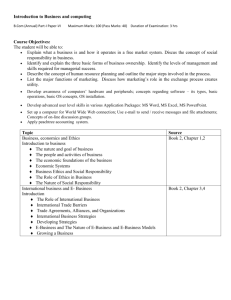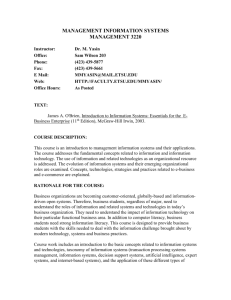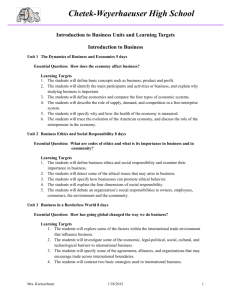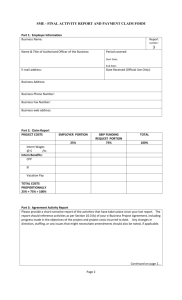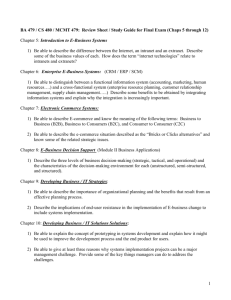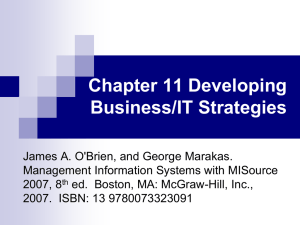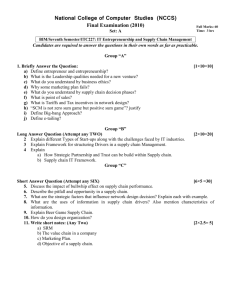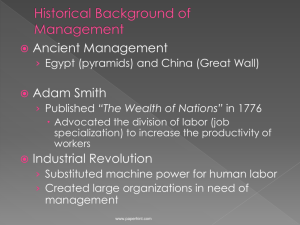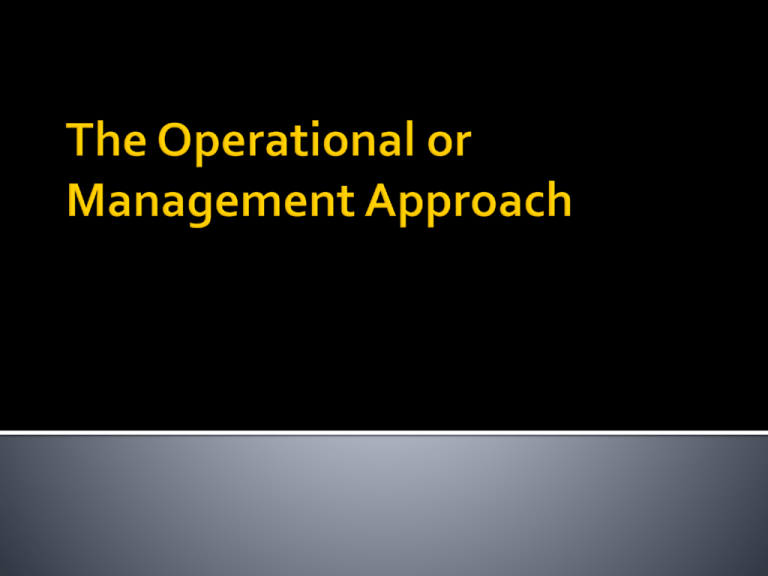
External and Internal Environment
Types of Businesses
What is a non profit business?
Management is the process of designing and
maintaining an environment in which
individuals, working together in groups,
efficiently accomplished selected aims.
Top level
Managers
Middle Level
Managers
First level
Supervisors
Conceptual and Design Skills –
Top Managers
Human Skills for Middle
Managers
Technical skills for
Supervisors
Productivity = outputs/inputs
“The greatest opportunity for increasing
productivity is surely to be found in knowledge
work itself, and especially in management.” Peter F. Drucker
Effectiveness is the achievement of objectives.
Efficiency is the achievement of the ends with
the least amount of resources.
Managing as a practice is an art;
The organized knowledge underlying the
practice may be referred to as a science.
Concepts. Mental images of anything formed by
generalization from particulars.
Scientific Method. Determination of facts
through observation.
When generalizations and hypothesis are tested,
they are called Principles.
Theory. It is a systematic grouping of a
interdependent concepts and principles that gives
a framework to, or ties together, a significant
area of knowledge.
System Defined
A set of interrelated and interdependent parts
arranged in a manner that produces a unified whole.
Basic Types of Systems
Closed systems
▪ Are not influenced by and do not interact with their
environment (all system input and output is internal).
Open systems
▪ Dynamically interact to their environments by taking in
inputs and transforming them into outputs that are
distributed into their environments.
Coordination of the organization’s parts is
essential for proper functioning of the entire
organization.
Decisions and actions taken in one area of the
organization will have an effect in other areas of
the organization.
Organizations are not self-contained and,
therefore, must adapt to changes in their
external environment.
Ancient Management
Egypt (pyramids) and China (Great Wall)
Venetians (floating warship assembly lines)
Adam Smith
Published “The Wealth of Nations” in 1776
▪ Advocated the division of labor (job specialization) to
increase the productivity of workers
Industrial Revolution
Substituted machine power for human labor
Created large organizations in need of management
Scientific Management
Operational Management Theory
Quantitative Management Approach
The Emergence of Behavioral Science
Systems Approach
Fredrick Winslow Taylor
The “father” of scientific management
Published Principles of Scientific Management (1911)
▪ The theory of scientific management
▪ Using scientific methods to define the “one best way” for a job to be
done:
Putting the right person on the job with the correct tools and
equipment.
Having a standardized method of doing the job.
Providing an economic incentive to the worker.
1. Develop a science for each element of an individual’s work,
which will replace the old rule-of-thumb method.
2. Scientifically select and then train, teach, and develop the
worker.
3. Heartily cooperate with the workers so as to ensure that all
work is done in accordance with the principles of the science
that has been developed.
4. Divide work and responsibility almost equally between
management and workers.
5. Management takes over all work for which it is better fitted
than the workers.
Exhibit 2.2
Copyright © 2005 Prentice Hall, Inc. All rights reserved.
2–18
Frank and Lillian Gilbreth
Focused on increasing worker productivity through
the reduction of wasted motion
Developed the microchronometer to time worker
motions and optimize performance
How Do Today’s Managers Use Scientific
Management?
Use time and motion studies to increase productivity
Hire the best qualified employees
Design incentive systems based on output
Henri Fayol
Believed that the practice of management was
distinct from other organizational functions
Developed fourteen principles of management
that applied to all organizational situations
1. Division of work.
7.
Remuneration.
2. Authority.
8.
Centralization.
3. Discipline.
9.
Scalar chain.
4. Unity of command.
10. Order.
5. Unity of direction.
11. Equity.
6. Subordination of
individual interest to
the interests of the
organization.
12. Stability of tenure
of personnel.
13. Initiative.
14. Esprit de corps.
Exhibit 2.3
Quantitative Approach
Also called operations research or management
science
Evolved from mathematical and statistical
methods developed to solve WWII military
logistics and quality control problems
Focuses on improving managerial decision
making by applying:
▪ Statistics, optimization models, information models,
and computer simulations
Organizational Behavior (OB)
The study of the actions of people at work; people
are the most important asset of an organization
Early OB Advocates
Robert Owen
Hugo Munsterberg
Mary Parker Follett
Chester Barnard
A series of productivity experiments conducted
at Western Electric from 1927 to 1932.
Experimental findings
Productivity unexpectedly increased under imposed
adverse working conditions.
The effect of incentive plans was less than expected.
Research conclusion
Social norms, group standards and attitudes more
strongly influence individual output and work
behavior than do monetary incentives.
Interpersonal Roles
The figurehead role
The leader role
The liaison role
Informational Roles
The recipient role
Disseminator role
The spokesperson role
Decision Roles
The entrepreneurial role
The disturbance-handler role
The resource-allocator role
The negotiator role
Strategy
Structure
Systems
Style
Staff
Shared value
Skills
Contingency Approach Defined
Also sometimes called the situational approach.
There is no one universally applicable set of
management principles (rules) by which to
manage organizations.
Organizations are individually different, face
different situations (contingency variables), and
require different ways of managing.
2–29
• Organization size
• Routineness of task technology
• Environmental uncertainty
• Individual differences
Exhibit 2.7
Globalization
Ethics
Workforce Diversity
Entrepreneurship
E-business
Knowledge Management
Learning Organizations
Quality Management
Globalization
Management in international organizations
Political and cultural challenges of operating in a
global market
Ethics
Increased emphasis on ethics education in college
curriculums
Increased creation and use of codes of ethics by
businesses
2–32
Workforce Diversity
Increasing heterogeneity in the workforce
▪ More gender, minority, ethnic, and other forms of
diversity in employees
Aging workforce
▪ Older employees who work longer and do not retire
▪ The increased costs of public and private benefits for
older workers
▪ An increasing demand for products and services related
to aging.
Entrepreneurship Defined
The process whereby an individual or group of
individuals use organized efforts to create value and
grow by fulfilling wants and needs through innovation
and uniqueness.
Entrepreneurship process
Pursuit of opportunities
Innovation in products, services, or business methods
Desire for continual growth of the organization
2–34
E-Business (Electronic Business)
The work preformed by an organization using
electronic linkages to its key constituencies
E-commerce: the sales and marketing component of
an e-business
Categories of E-Businesses
E-business enhanced organization
E-business enabled organization
Total e-business organization
Exhibit 2.9
Knowledge Management
The cultivation of a learning culture where
organizational members systematically gather
and share knowledge with others in order to
achieve better performance.
Learning Organization
An organization that has developed the capacity
to continuously learn, adapt, and change.
What is meant by the term “management theory
jungle”?
Do various approaches to the analysis of
management represent a management theory
jungle, or do they represent simply an
intellectual division of labor?
Behavioral Approach
Problems

